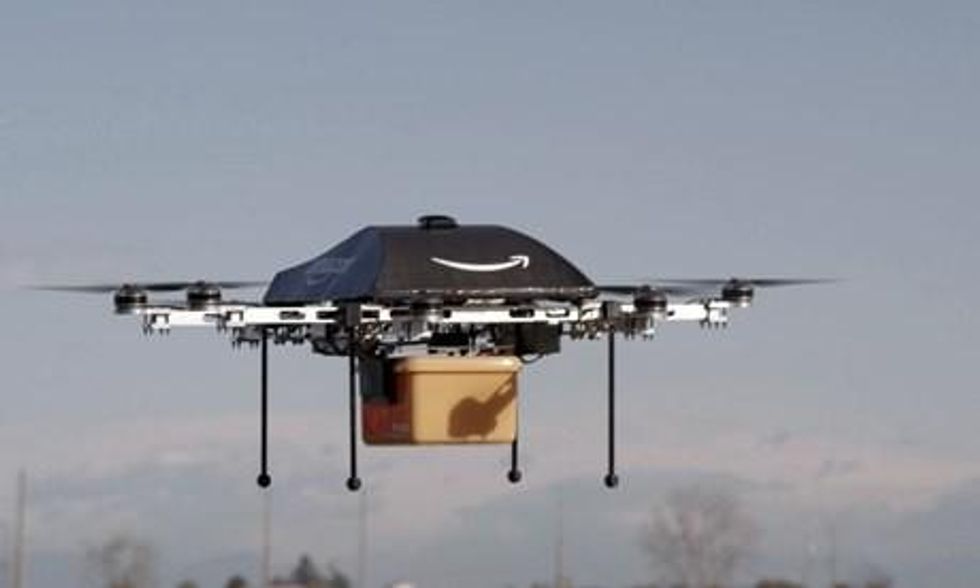It's a brave new world, a whole new paradigm. Or so you'd think if you read most of the breathless coverage about the announcement, which will only get worse: expect a torrent of turgid think-pieces in the next 48 hours about who's going to get "disrupted" as a result of this latest shake-up - and what it means for the US's already beleaguered postal service.
Here's the problem: it's all hot air and baloney. As Jeff Bezos, Amazon's CEO, acknowledged in the 60 Minutes segment, his plan to begin delivery by drone won't be enacted until around 2018 - and that's a hugely optimistic timeline.
The practical issues are manifold: the technology to make the drones operational in any sense is not yet in place. It's all well and good for the unmanned vehicles to fly to a particular GPS site, but how does it then find the package's intended recipient? How is the transfer of the package enacted? What stops someone else stealing the package along the way? And what happens when next door's kid decides to shoot the drone with his BB rifle?
None of that starts to come close to the legal minefield using drones in this way entails. At present, flying drones of this sort for commercial use would be illegal in the US. The Federal Aviation Administration (FAA), which regulates this area, intends to make commercial drones legally viable and workable by 2015, but this deadline is all-but impossible: managing the skies with this much low-level traffic is a problem people are nowhere near solving. Opening up crowded urban areas full of terror targets to large numbers of flying platforms is always going to be packed with conflicting interests and difficulties. And all this has come before the first lawsuit caused after someone is injured by a faulty drone (or that one your neighbour shot), crashing down to earth.
What Jeff Bezos announced amounted, essentially, to an aspiration to change how his company delivers products, in about five years time, if technology advances and regulation falls his way. If his TV appearance hadn't included the magic word "drones", Bezos's vague aspirations to change an aspect of his company's logistics probably wouldn't have made waves. Lucky for him, he did - winning his company positive publicity just ahead of what is usually the biggest online shopping day of the year, the dreadfully named Cyber Monday.
Floating an exciting-but-impractical innovation for a swathof press coverage is such an old PR tactic you'd hope no one would fall for it, and yet everyone still does. In an industry dominated by page views, stuff people will click on that is easy to produce is an irresistible draw. Who cares if it actually stands up?
Bezos' neat trick has knocked several real stories about Amazon out of the way. Last week's Panorama investigation into Amazon's working and hiring practices, suggesting that the site's employees had an increased risk of mental illness, is the latest in a long line of pieces about the company's working conditions - zero-hour contracts, short breaks, and employees' every move tracked by internal systems. Amazon's drone debacle also moved discussion of its tax bill - another long-running controversy, sparked by the Guardian's revelation last year that the company had UK sales of PS7bn but paid no UK corporation tax - to the margins. The technology giants - Amazon, Google, Microsoft et al - have have huge direct reach to audiences and customers, the money to hire swarms of PR and communications staff, and a technology press overwhelmingly happy to incredulously print almost every word, rather than to engage in the much harder task of actually holding them to account.
It's too late for the clickfarms already. But outlets and journalists who'd like to think of themselves as serious must stop regurgitating this crap. And, even more importantly, you,concerned citizen, must try to stop clicking on it.
